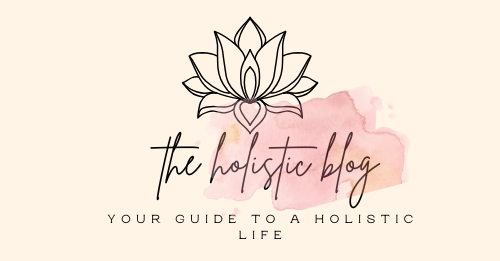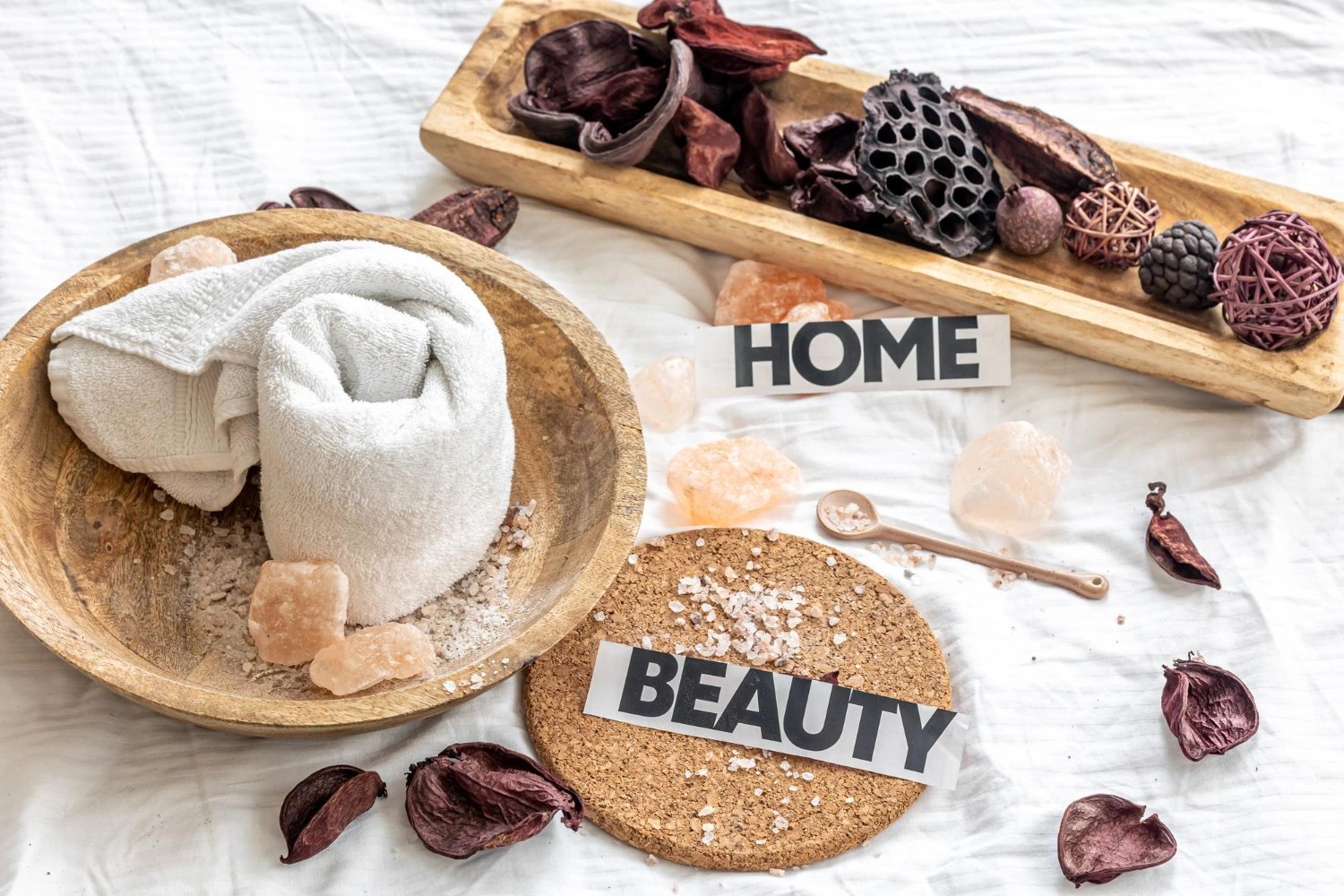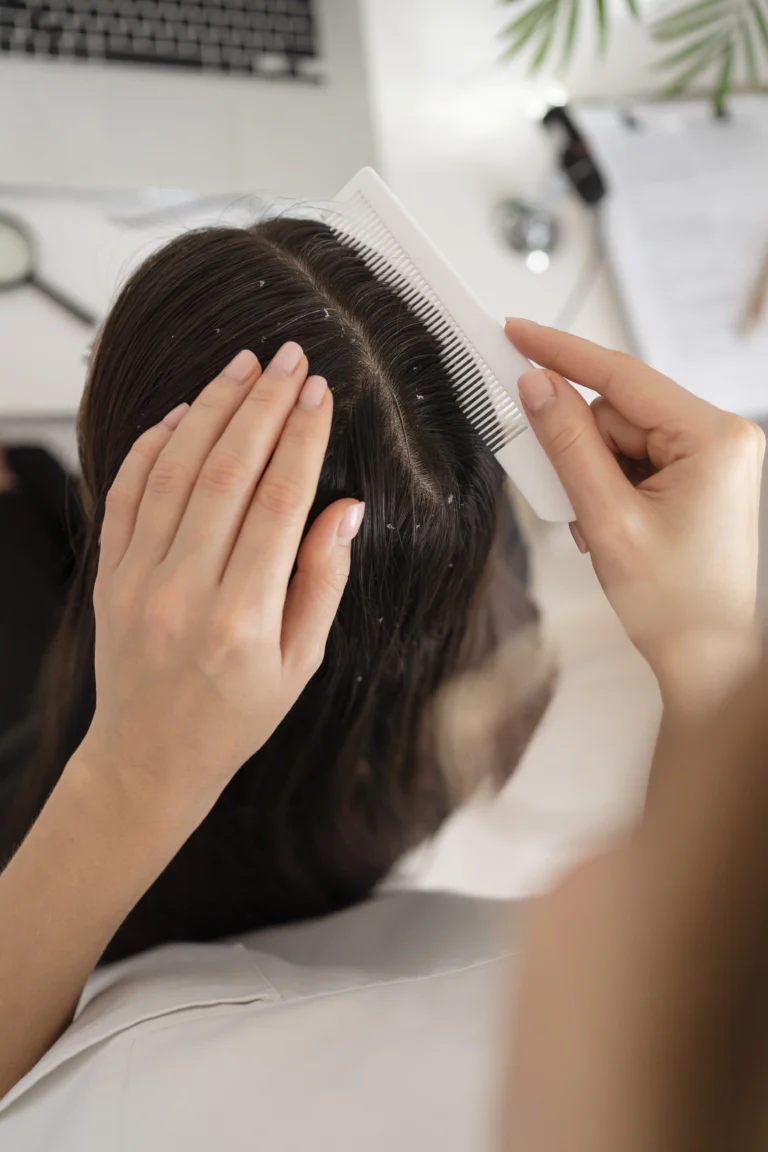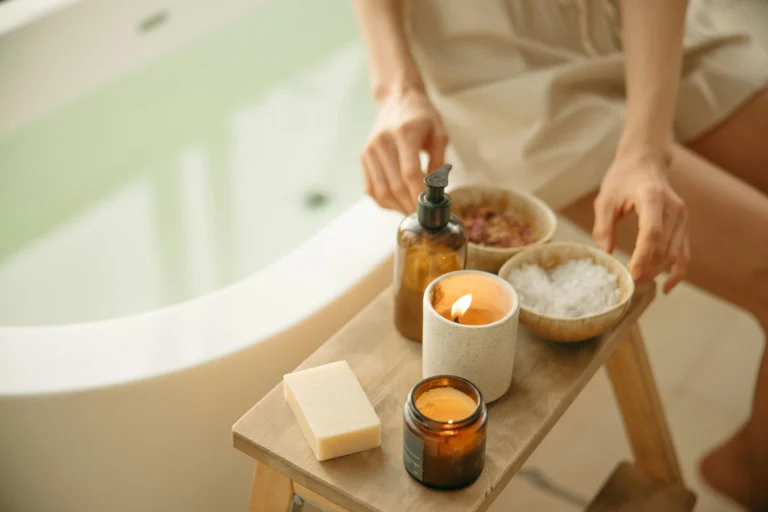5 Powerful Steps to Build a Holistic Skincare Routine for Sensitive Skin
Table of Contents
Have you ever stood in front of the mirror, frustrated by the redness, irritation, or tightness staring back at you? Maybe you’ve bounced from one skincare trend to another yet nothing seems to work. If your skin feels like it reacts to everything, you’re not alone. Sensitive skin requires a special kind of care,one that goes beyond products and dives into how you care for your body, mind, and environment. That’s where a holistic skincare routine for sensitive skin comes in.
This isn’t just about what you put on your face. It’s about how you live, how you eat, and how you soothe your nervous system. It’s about treating your skin like the delicate, intelligent organ it is. Let’s walk through a routine designed to calm, nourish, and empower your skin naturally.
What Is a Holistic Skincare Routine for Sensitive Skin?
Defining Holistic Skincare
Holistic skincare is all about looking at the big picture. You’re not just addressing symptoms like dryness or breakouts you’re supporting your skin by balancing every part of your lifestyle. This means:
- Choosing natural, non-toxic ingredients
- Listening to your skin’s unique needs
- Prioritizing your inner health like diet, sleep, and stress levels
You stop chasing quick fixes and start nurturing your skin from within.
Why Sensitive Skin Benefits Most
Sensitive skin often reveals signs of imbalance more quickly than other skin types. Harsh chemicals, artificial fragrances, and even stress can leave it inflamed, itchy, or dry. A holistic approach avoids triggers and instead builds resilience, one gentle step at a time.
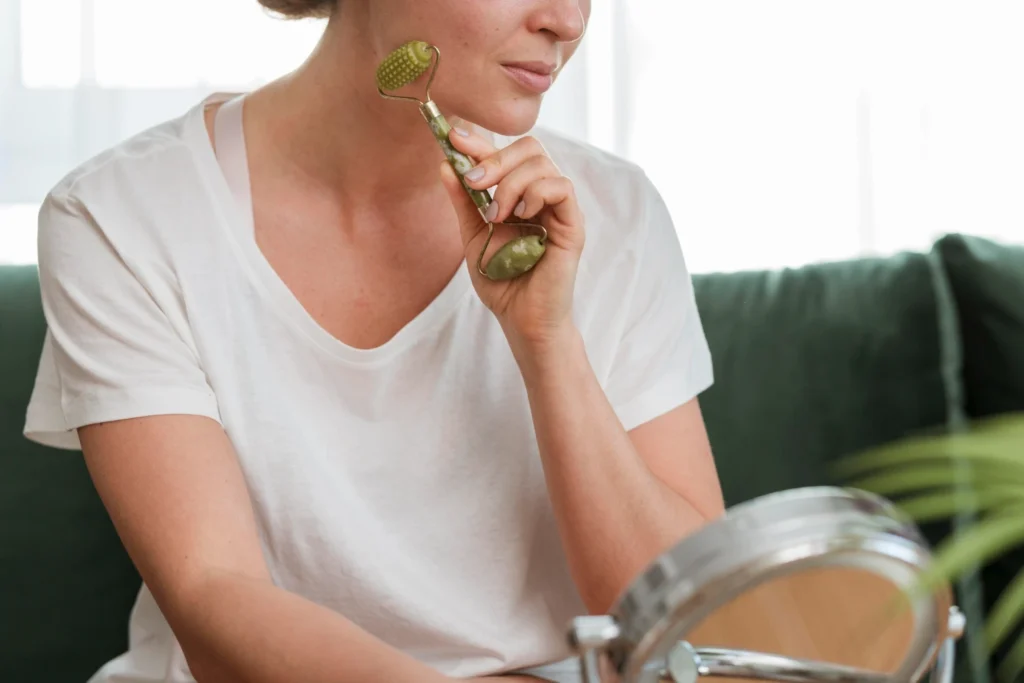
Step-by-Step Holistic Skincare Routine for Sensitive Skin
Let’s break down your new daily ritual. These steps aren’t rigid; they’re meant to guide and adapt to your personal rhythm.
Step 1: Cleanse Gently
Sensitive skin thrives when you treat it tenderly. Cleansing is the foundation but go easy.
- Use fragrance-free, pH-balanced cleansers
- Avoid foaming products with sulfates or alcohol
- Look for ingredients that soothe, not strip
Go-To Ingredients:
| Ingredient | Why It Works | Notes |
| Aloe Vera | Soothes irritation, calms inflammation | Lightweight hydration |
| Chamomile | Reduces redness and puffiness | Anti-inflammatory |
| Oat Extract | Strengthens skin barrier, locks in moisture | Ideal for eczema-prone skin |
Lightly dab your face dry using a clean, soft towel. No scrubbing think soft, not squeaky clean.
Step 2: Hydrate with a Healing Toner
Toners balance your skin’s pH after cleansing and prep it for moisture. For sensitive skin:
- Choose alcohol-free formulas
- Opt for calming hydrosols like rose water or cucumber
- Avoid essential oils if your skin is reactive
Toners should leave your skin feeling refreshed not tight.
Step 3: Moisturize with Intention
Your skin barrier is your first line of defense. Help it stay strong with nourishing moisturizers.
- Look for ceramides, hyaluronic acid, and glycerin
- Natural oils like jojoba, calendula, or squalane support hydration without clogging pores
- Steer clear of petroleum-based products and synthetic fragrances
Consistency is key. Your moisturizer works both morning and night to seal in hydration and protect your skin from environmental stressors.
Step 4: Treat Without Triggering
If you’re dealing with redness, bumps, or dullness, spot treatments can help but choose wisely.
- Use diluted tea tree oil for occasional breakouts
- Turmeric masks can reduce inflammation naturally
- Try enzyme exfoliants (like papaya or pineapple) instead of harsh scrubs
Apply treatments no more than 2–3 times a week, and always patch-test first.
Step 5: Protect with Clean Sunscreen
Daily sun protection is non-negotiable even on cloudy days. But not all SPF is created equal.
- Go for mineral sunscreens with zinc oxide or titanium dioxide
- Avoid oxybenzone, avobenzone, and synthetic filters
A gentle sunscreen helps prevent sun-triggered irritation and long-term damage.
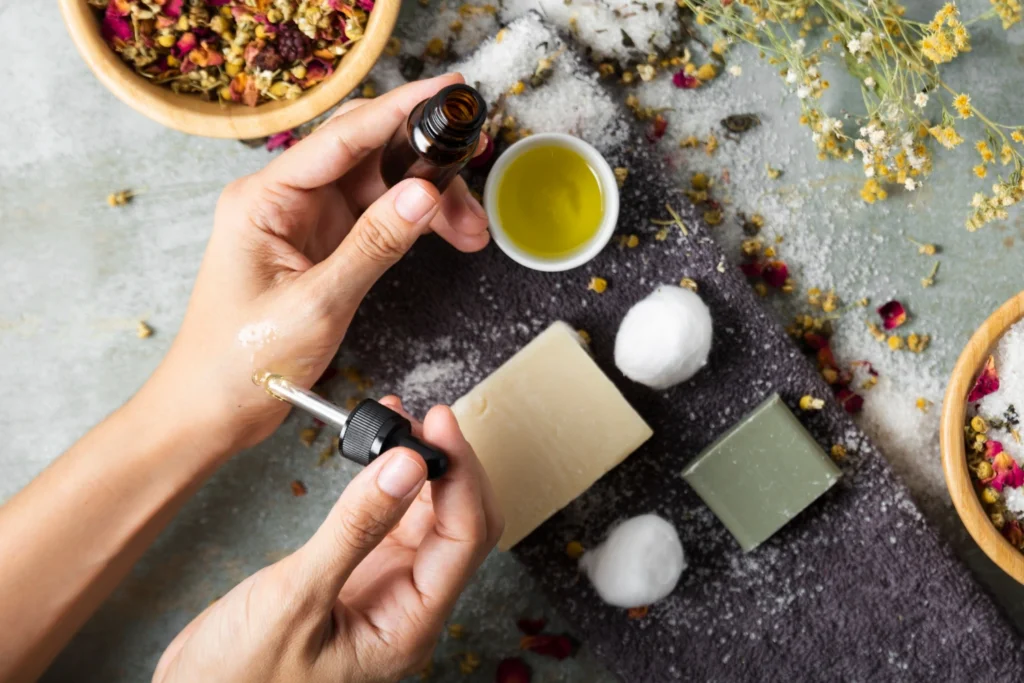
Support Your Skin from the Inside
The Gut-Skin Connection
Your digestive health directly impacts your skin’s behavior. When your gut is inflamed, your skin often shows it.
- Add probiotics to your routine either through supplements or fermented foods like yogurt, kefir, or sauerkraut
- Support digestion with fiber-rich foods, bone broth, and plenty of water
A balanced gut helps your skin stay calm and clear.
Anti-Inflammatory Diet for Glowing Skin
What you eat matters more than you think. Some foods soothe, while others stir up trouble.
Include These:
- Chia seeds & walnuts – full of omega-3s
- Leafy greens & sweet potatoes – antioxidants and vitamins A & C
- Berries – anti-inflammatory and high in fiber
Avoid These:
- Sugar – spikes inflammation
- Dairy – can trigger eczema or acne
- Highly processed foods – disrupt your microbiome
You don’t have to be perfect. Just start swapping one irritant for one skin-loving food at a time.
Your Lifestyle Is Your Skincare
Stress Reduction for Skin Health
Stress floods your system with cortisol your skin’s worst enemy.
Try weaving in:
- Yoga or stretching (even 10 minutes helps)
- Deep breathing or guided meditation
- Journaling : release your thoughts instead of bottling them up
Less stress = fewer flare-ups.
Sleep & Hydration
- Aim for 7–9 hours of uninterrupted sleep each night
- Sip water throughout the day not just when you’re thirsty
- Herbal teas like chamomile, nettle, or spearmint support skin detoxification
Your body repairs itself while you sleep. Don’t skip your rest your glow depends on it.
Natural Ingredients: What to Embrace and Avoid
Some ingredients soothe your skin like a warm hug. Others? Not so much.
| Embrace This | Avoid This |
| Aloe Vera | Synthetic Fragrance (Parfum) |
| Calendula | Alcohol (Denatured) |
| Green Tea Extract | Sulfates |
| Rose Water | Artificial Dyes |
If you can’t pronounce it and don’t know what it does, your skin probably doesn’t need it.
Customize Your Routine to Fit Your Life
No two people have the same skin. Yours deserves a routine that evolves with your needs.
- Pay attention to how your skin reacts to the weather, diet, stress, and products
- Introduce one product at a time and wait a few days before adding another
- Keep a simple skincare journal to track progress and reactions
And remember: healing takes time. Be patient with yourself.
Avoid These Common Mistakes
You’re doing your best, but here’s what to steer clear of:
- Over-cleansing or exfoliating too often
- Changing your routine too frequently
- Using multiple actives at once
- Believing “natural” means risk-free (always patch-test!)
Stick to a routine that centers on kindness your skin will respond with clarity and calm.
FAQs: Holistic Skincare Routine for Sensitive Skin
Can a holistic skincare routine really replace prescriptions?
In many cases, yes especially for mild to moderate concerns. However, always consult a dermatologist for severe or chronic conditions.
How soon will I see results?
You may notice subtle improvements within a few weeks, but most people need 4–8 weeks to see visible changes. Consistency is key.
Are DIY masks and home remedies safe for sensitive skin?
Some are but proceed with caution. Even natural ingredients like lemon or baking soda can irritate. Always test a small area first.
Does drinking more water actually help my skin?
Hydration supports your body’s detox process and helps your skin retain moisture. It’s not a magic fix but it absolutely plays a role.
Conclusion: Embrace the Gentle Journey
Your sensitive skin doesn’t need to be “fixed.” It needs to be understood, supported, and treated with the same care you’d give a loved one. A holistic skincare routine for sensitive skin isn’t a trend it’s a long-term relationship with your wellness.
Each small decision from what you eat to how you rest adds up to a calmer, clearer complexion.
Because your skin deserves more than band-aids. It deserves healing from the inside out.
